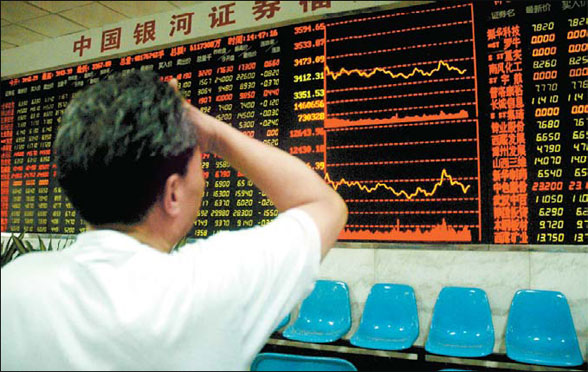
|
BIZCHINA> Review & Analysis
 |
|
Related
Braced for a fall
By Jin Jing (China Daily)
Updated: 2008-06-02 11:38  Rising inflation, an exports slowdown and natural disasters in China are expected to further squeeze corporate profit margins, a scenario which would make the high valuation of Chinese stocks hard to justify, analysts say. "The earnings of all A-share companies are expected to slow down in the coming months this year. The A-share valuation pressure will be larger when its average price-earnings ratio rising over 25 times," says Li Bin, an analyst at CICC. Jin Yanshi, chief economist at Sinolink Securities, says in a column that the growth of China's stock market will possibly slow due to declining corporate earnings. Meanwhile, the May 12 earthquake in Southwest China's Sichuan province has largely damaged the agricultural production in the quake-hit zone, and may affect the national food supply for certain products and further increase inflation. "The government is facing further challenge to balance its policy tools," says Shen Minggao at Citi China. "On one hand, it has to reduce credit controls on investments in the infrastructure and salvage activities in the disaster areas, and on the other, it could face high inflation triggered by rising production costs." Economists are widely expecting the government to relax the employment and infrastructure policies in that district. Jing Ulrich, chairman of JPMorgan China Equities, said in mid-May that A-share companies are still expected to rise a further 20 percent until the end of this year because of the expected relaxed measures. "Stocks in different sectors are expected to have contrasting performances this year. Investors can pay more attention to companies in growth industries, such as banks," says Ulrich. "Because of rising production costs, an appreciating currency, weaker external demand and fiercer competition from factories in neighboring countries such as Vietnam, Bangladesh and Cambodia, Chinese firms are facing increasing challenges to remain profitable, or even to survive," said Sun Mingchun, an economist at Lehman Brothers Inc in a latest report. A total of 1,553 listed companies in the Shanghai and Shenzhen stock exchanges have reported only a slight 17.4 percent increase in corporate earnings growth in the first quarter this year, according to statistics from TX Investment Consulting Co Ltd. Exports-led and inflation-sensitive industries have suffered profit declines. Electric power, petroleum and chemical companies have reported sharp decreases in earnings because of rising costs and government's price controls. The petroleum and chemical industry posted a 68.37 percent profit slide in the first quarter, followed by the electrical industry with 71.63 percent earnings decline and a petroleum industry slide of 27.31 percent. In response, shares of oil stocks listed on mainland exchanges fell in latest months. PetroChina, which reported 31.5 percent earnings growth decline in the first quarter, has plunged 44 percent since the beginning of this year. Sinopec dropped around 50 percent since January, and it reported a 65.8 percent slowdown in earnings in the first quarter. "Many mainland low-end manufacturers are also faced with the pressure from soaring costs and slowdown of global demand," says Ulrich. Meanwhile, some larger firms will gain pricing power due to accelerated consolidation in heavy industry. For example, China's largest steel maker Baosteel Group won the government's approval in March to set up a new company in Guangzhou and acquire two steel groups, Shaoguan iron & Steel Group and Guangzhou Iron & Steel Enterprises Group. "China's overcapacity should result in a much-needed shakeout of many of China's small, inefficient firms, leaving the survivors in an even stronger position," says Sun. "The next few years present a great opportunity for China's financially stronger and more efficient firms to consolidate market shares and eventually gain more pricing power when demand starts to strengthen," Sun adds. "That means equity investors still have opportunities to make something out of what could be a painful cleansing process in China's corporate sector." In addition, the bad performance of the mainland stock market in the first quarter lowered the corporate investment income, especially for insurance companies and security firms, whose income are largely relies on investments. Statistics from TX Investment Consulting Co Ltd showed that investment income now accounts for 17.47 percent of total corporate income in the first quarter, down from 20.65 in 2007. Insurance companies posted an average of 65.7 percent slid in net profit, and security firms had a 49.9 percent decline in earnings, according to statistics from China International Capital Corporation Limited (CICC). However, analysts said they were still optimistic about the performance of large and medium sized banks because of their lower funding costs compared to smaller banks. (For more biz stories, please visit Industries)
|